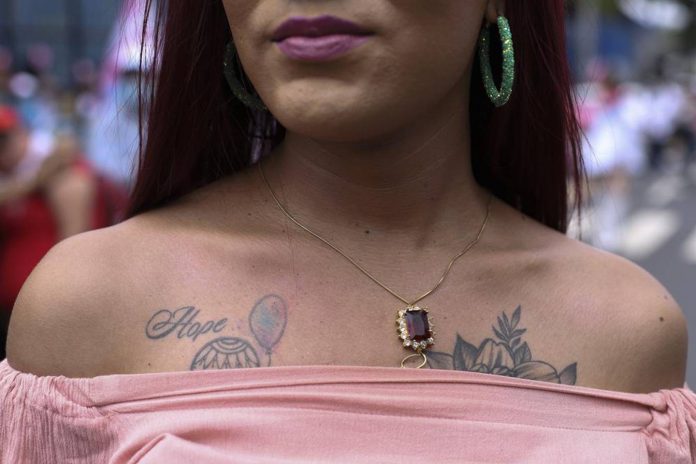Rejected by her family, Zashy Zuley del Cid Velásquez fled her coastal village in 2014, the first of a series of forced displacements across El Salvador. She had hoped that in the larger city of San Miguel she could live as a transgender woman without discrimination and violence, but there she was threatened by a gang.
She moved away from San Miguel then back again in a series of forced moves until the 27-year-old was shot dead on April 25, sending shockwaves through the close-knit LGBTQ community in San Miguel, the largest city in eastern El Salvador.
“Zashy was desperate; her family didn’t want her because of her sexual preference and the gangsters had threatened her,” said Venus Nolasco, director of the San Miguel LGBTQ collective “Pearls of the East.” “She knew they were going to kill her. She wanted to flee the country, go to the United States, but they killed her with a shot through her lung.”
One day after Del Cid’s murder, U.S. Vice President Kamala Harris identified anti-LGBTQ violence in Central America as one of the root causes of migration in the region during a virtual meeting with the president of neighboring Guatemala, Alejandro Giammattei. She is scheduled to visit Guatemala and Mexico this week.
Transgender migrants were present in the Central American caravans that attempted to reach the United States border in recent years, fleeing harassment, gang extortion, murder and police indifference to crimes against them. Even in those large migrant movements say they faced harassment.
Things had been rough during Del Cid’s first stint in San Miguel. She and Nolasco had been living in a neighborhood where, as in many parts of the country, the MS-13 gang was the ultimate local authority. Gang members began to harass her, then brutally beat her, breaking her arm in 2015, Nolasco said.
“They warned her to leave, but she didn’t listen,” Nolasco said.
Instead of leaving, Del Cid moved in with Nolasco in the same neighborhood. One day, the gang grabbed Del Cid again.
“They took her, they wanted to kill her,” Nolasco said. “I begged them not to kill her, to let her go and she would leave the neighborhood.”
Del Cid moved back to her hometown, but her family rejected her again. She tried to please them, but she couldn’t, Nolasco said. Del Cid joined a church, got a girlfriend, had a baby girl, but could not maintain that life, she said.
She returned to San Miguel, where initially things seemed to go better. In 2020, Del Cid received humanitarian and housing support from COMCAVIS TRANS, a national LGBTQ rights organization, and the United Nations High Commissioner for Refugees.
Del Cid rented a home and opened a beauty salon there. She hired another woman to help her and was participating in a entrepreneurship program. She was preparing a business proposal to move the salon out of her home into its own space.
But Del Cid was shot in the back walking alone at night down the street. Passersby tried to help her and took her to a local hospital where she died. So far, police have made no arrests and Nolasco believes that like other hate crimes in the country, “it will be forgotten; they’re not interested in what happens to us.”
Laura Almirall, UNHCR representative in El Salvador, said Del Cid’s killing frightened her community and saddened everyone who knew her.
“She was excited about her new plans and her new life. And unfortunately and tragically, everything came to an end,” she said.
Nolasco said that in San Miguel, some 90 miles (150 kilometers) east of the capital, the transgender community endures constant harassment from intolerant residents and gangs. They have rocks thrown at them, are beaten and extorted. If they go to police to make a report, they are insulted and demeaned. “Don’t come here to claim rights, because there are no rights for you,” police tell them, Nolasco said.
The “Pearls of the East” group has a parade squad in which Del Cid participated. It started with some 50 people, but crime and forced displacement have shrunk it to 35, Nolasco said.
“No one does anything here to protect us,” Nolasco said.
Bianka Rodríguez, director of COMCAVIS TRANS, said the forced displacement of transgender people in El Salvador increases each year. Even though a law exists to protect people displaced by violence, it hasn’t been effective, she said.
A report prepared by the organization found that gangs were responsible for nearly two-thirds of the violence against the LGTBQ community, while government authorities accounted for another 21%. Since 1993 in El Salvador, a country of only 6.5 million inhabitants, more than 600 LGBTQ people have been killed, according to their tally.
They registered 84 cases of internal displacement in 2019 and another eight who left the country, but were deported and needed protection.
“Regrettably, (multiple displacements) are very common not only for the LGBTI community, but thousands of people in El Salvador have been displaced because of gang violence and often we find that displacement does not occur only once, but families and individuals are displaced more than once,” Almirall, the UNHCR representative, said.
Del Cid “was displaced so many times in the country and finally she managed to get a new life project and to be part of the community again and everything ended so abruptly and so tragically,” Almirall said.





























